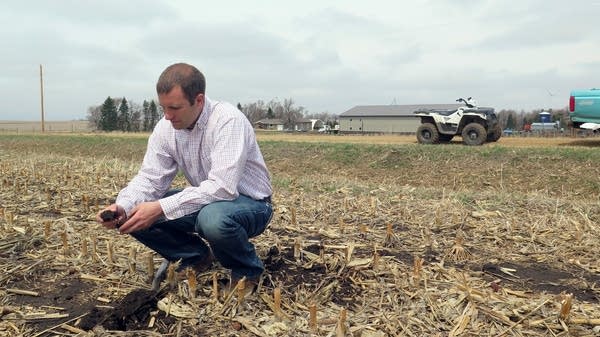Farmers plant seeds of uncertainty

On the first day of May, Brian Fruechte sinks a shovel into the rich topsoil of his farm in southwest Minnesota. It goes down smoothly at first, but then stops. The shovel has hit something hard.
"About a foot deep, there's frost down there," said Fruechte.
Frozen soil in May is something Minnesota farmers haven't found in years. But it fits right in with a pattern that brought other bouts of unusual weather, including a mid-April blizzard that dumped as much as 2 feet of snow in this area. The bad weather has slowed the start of spring planting.
"Certainly the last few years, we've had outstanding early planting conditions," said Fruechte. "Maybe this is a little bit more normal."
Create a More Connected Minnesota
MPR News is your trusted resource for the news you need. With your support, MPR News brings accessible, courageous journalism and authentic conversation to everyone - free of paywalls and barriers. Your gift makes a difference.
Planting delays are the latest in a long list of concerns affecting farmers. There are also issues like trade disputes, the farm bill and a yearslong run of low commodity prices.
"It's getting tight," said Minnesota Farmers Union President Gary Wertish. "It's getting a little bit tougher when you don't see a light at the end of the tunnel."
If the late spring hurts yields next fall, that will lower revenue and cause more problems on the farm. A study by state college and university farm management programs showed that the average income for Minnesota crop farmers last year was only about $24,000, down by roughly half from 2016.

Wertish said some farmers will need help to stay in business. Congress is deciding now how much money to spend on farm subsidy payments as it discusses new farm legislation.
"We don't think it's out of line to ask for more money in this farm bill," said Wertish.
The Farmers Union is not happy with the legislation currently moving through Congress, saying it fails to provide meaningful help to farmers struggling with low commodity prices. Those prices could go even lower if trade disputes with China and the NAFTA countries remain unresolved.
"There is sort of this trend right now away from free trade," said University of Illinois farm management professor Gary Schnitkey. "And that would be not a good thing for agriculture, because we export a lot of our products."
Schnitkey and his colleagues studied what might happen if China enacts its proposed 25 percent tariff on U.S. soybean imports. They found that soybean prices would drop by about 9 percent. A typical grain farm could see profits decline by two-thirds. Long-term impacts could include a drop in land prices, which would further erode a farm's financial position.
But for farmers like Brian Fruechte in southwest Minnesota, trade concerns are probably not the main worry right now. That would be the wet, cold fields.
"As the days go by, we are going to be losing yield potential," said Fruechte. "But that doesn't mean that we can't have a great crop still."
If the weather cooperates, Fruechte should be planting this week. At least temporarily, that will leave concerns like the farm bill, low commodity prices and trade disputes in his rearview mirror.